Irene Lopez, a Christian teacher at the school in Mavrovouni camp in Lesbos, analyses the current situation of refugees and their needs.
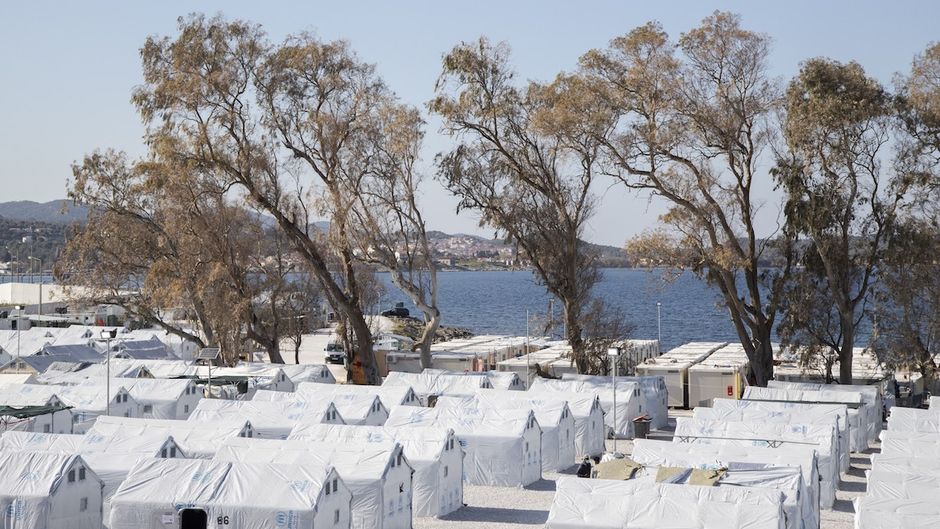 Blue area of the camp, where families and single women live / Eurorelief.
Blue area of the camp, where families and single women live / Eurorelief.
The routine of Irene Lopez, a teacher in the Mavrovouni refugee camp, which replaces the old Moria camp destroyed by fire in September 2020, involves many things.
From standing on her bike to greet the residents she meets, to giving her ID and chatting for a while with the security guard at the entrance of the camp.
Lopez works at the school for children in the camp, run by the Christian-inspired organisation Eurorelief.
"We are developing a curriculum to teach English that has been created specifically for the refugee camp. It is being developed by another organisation called Teach Beyond and it is illustrated so that the characters look like the children in the camp. That's a very special part of my work because it helps the children to be able to identify with the characters and the stories and the context in which they are going through".
Furthermore, "we try to work on a socio-emotional level, offering space for the children to express their emotions either through music or art".
In the camp, which has a population of approximately 2,000 people, there are up to 22 nationalities represented, according to the volunteer. The majority comes from Afghanistan (45%), followed by Somalia (22%) and Sudan (7%).
"But it seems to depend on the islands and the migratory routes. On Samos, a third of the people in the camp are Palestinians", says Lopez.
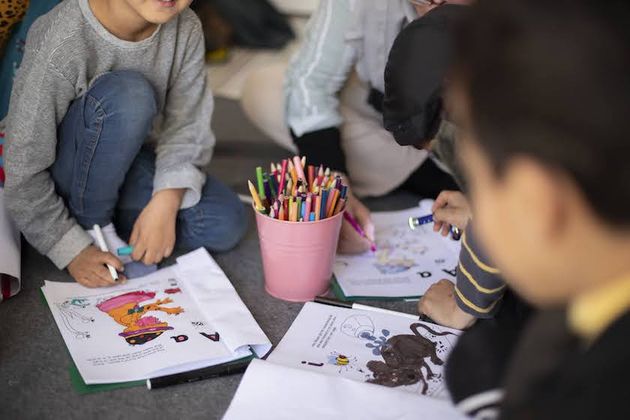
Question: What is the situation in Lesbos now, two years after the fire that forced to relocate the Moria camp on another part of the island?
Answer: When Moria burned down, they built this new camp in a military facility in Kara Tepe. At first there were only tents.
Shortly after the camp was set up, the tented area flooded during the winter rains of 2021. Improvements were made thereafter. Containers were installed and assembled housing units were built, in which the camp families were housed, gradually replacing the tents.
These cabins are designed to be a temporary shelter and over time they have been adapted to the reality of the camp, for example by improving their thermal insulation, both in winter and summer.
Most families and vulnerable people live in barracks, and in the area for arrivals and single men there are prefabricated cabins.
Sanitary facilities have also been improved. When the camp opened, the toilets were portable urinals on the construction site and the showers were very precarious. Since 2021, they have built shower and toilet areas in barracks for this purpose.
A new camp is currently under construction in the centre of Lesbos. This camp will improve many of the conditions of the facilities, but it will also make the camp residents much more isolated from the population centres and their services.
Q: Could that have anything to do with the refusal to welcome refugees that some islanders have shown in the past?
A: Yes, probably. Since 2015, the Greek population has received a constant flood of people arriving on their shores and it has not been and is not easy for them to accept and manage their presence.
I think that part of the local population has a lot of reticence and reservations about the refugees partly because they are quite unfamiliar with the situations and the decisions that the Greek government and the European Union make regarding the management of the migration crisis.
That is why I believe that the new camp they are building is maybe trying to respond to this potential situation of ongoing conflict between the local population and the residents of the camp.
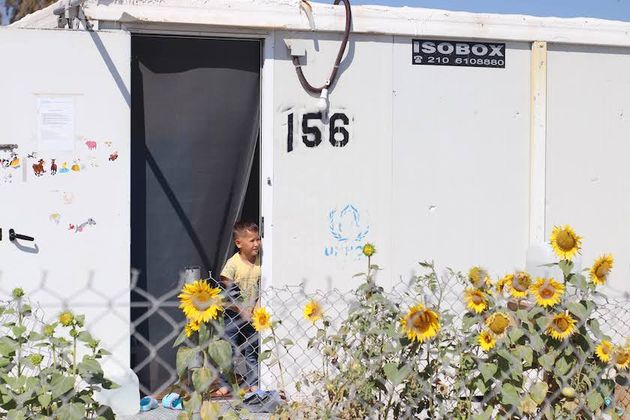
[photo_footer] One of the containers where one or two small families live together./ Eurorelief. [/photo_footer]
Q: How is the camp experiencing the cold this year?
A: The low winter temperatures in Lesbos are combined with rain and strong winds, which makes it a more complicated season.
Winter arrived three weeks before Christmas. Until then it wasn't cold. What they did then was to distribute two blankets per resident as a first step. A distribution of heaters was also pending, which could finally be carried out after consultation with the authorities on how to do it in a way that would not be a potential fire risk.
In September 2022 there was already a small fire and a few weeks ago there was another fire in one of the barracks. A small fire in one container eventually affects the neighbouring containers and can quickly spread across the camp.
The new camp is safer than Moria was. Several main roads have been laid out and the access for the fire brigade is much better prepared. Nevertheless, the electrical installations are still simple and if, for example, a family has four devices connected, they can take what they can take.
Q: A winter especially marked by the conflict in Ukraine
A: There is a perception among volunteers that the conflict in Ukraine has taken the media spotlight and the refugee situation in Greece has become secondary.
This happens despite the fact that, according to colleagues who have been in Lesbos longer, more people are starting to arrive than arrived in 2021, at the end of the year, with a significant influx of Afghan refugees.
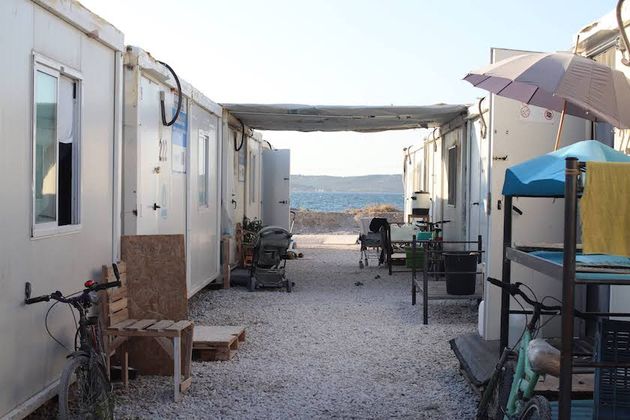
[photo_footer] One of the streets in the camp./ Eurorelief. [/photo_footer]
Q: Leaving the camp is always one of the most difficult moments for a refugee. How is this experienced in the new camp?
A: The asylum process is always complicated, especially when they come from countries where there is no serious conflict situation. It is especially difficult for those who have received one or more rejections in their asylum application: the uncertainty about the immediate future takes a huge emotional and psychological toll on refugees and desperation leads them to take extreme decisions.
We had a student who decided to leave the camp without having his papers in order. This is even more complex.
For refugees coming from countries in a particularly serious crisis situation, the procedures are less complex. Since the situation in Afghanistan became so complicated with the rise to power of the Taliban, it has become easier for Afghans to facilitate the asylum process, so they spend much less time in the camp than they used to.
Nevertheless, in my experience with students, the time can be a year and a half to two years in these cases.
I find, however, that the process is much faster than it used to be. Especially if the person applying for asylum has a family member living in another country in Europe, for example, or if they suffer from a specific situation of vulnerability.
But it is always a difficult thing. And more than the paperwork itself, the waiting and finding the money to pay for the asylum process. The next step, the journey to the new destination, is not easy either.
This is why, from the educational team, we are especially working with adolescent students to help them have a basic knowledge of how to cope in practical situations such as finding their way around an airport, for example, so that they can help their families.
Q: It must not have been an easy decision for you to go to Lesbos to serve
A: I had already been there in the summer of 2021 and the work I did then was logistical. We basically worked moving one part of the camp to the other while the assembled housing units were being built. So I knew a bit of the reality of the camp.
That work gave me the opportunity to engage in conversation with many of the people we were helping, but in a very occasional way. I realised that I just wanted to play and spend time with the children I met.
At that time there was already an educational team working in the camp, but as I was only there for a month I couldn't join it. I did ask to accompany them one day as an observer and was able to visit several children in their homes to teach them and spend some time playing with them. I found it a beautiful experience.
I returned home with it in my mind, but also with doubts. Several volunteers who returned with me had decided to leave their jobs to do humanitarian aid full time. Was the Lord calling me to do the same?
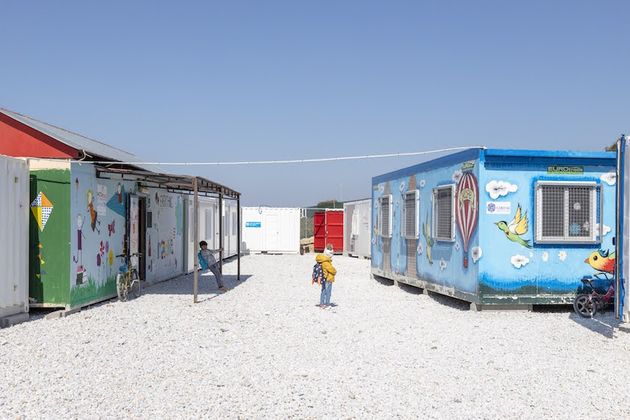
[photo_footer] The educational area of Mavrovouni camp./ Eurorelief. [/photo_footer]
I had committed to work for another year at the school I was at and I didn't want to leave them without notice. After the first term, I started thinking about it, asked for information and saw that Eurorelief had a job offer for teachers.
It was quite a big process until I made the decision. I had no doubts, but also no clear conviction at the beginning. After reviewing how I understand that God has led me through different experiences, spending two years working in the United States or the last five years in a highly complex centre, I made the decision.
It was a decision filled with prayer, but there was no moment of enlightenment. I applied, I interviewed and I was taken.
Just as I arrived in Lesbos, two teachers were leaving the camp, so I spent two weeks accompanying them in their routines and when they left I took over the two classes they had.
Q: What is the daily routine of a teacher in the camp like?
A: Our education team is made up of a coordinator, four teachers and four teaching assistants, because we always work in teams of two.
We start the day with a small meeting and preparing the materials for the day. During the morning we have two shifts of classes for children from 6 to 13 years old.
We currently have 75 children enrolled. The children always come to our classes voluntarily, because they want to. Our classrooms are very small. They are basically a container ship that holds ten to twelve pupils with two teachers.
The educational program includes literacy in English, which is the work that Eurorelief does, and Greek and mathematics, which is done by another organisation we collaborate with in the same educational area of the camp.
As the level of Greek they acquire is quite high, children who have been attending classes in the educational program in the camp for a long time are included in the Greek public schools and can attend them in the mornings.
In the public schools, they also offer specific classes for children from the countryside in the afternoons. The priority of the Greek government is that most of the children from the countryside can attend public schools.
In addition to the time we teach in the classroom, we visit our students weekly at home to reinforce what they have learnt and to see how the child is doing, talk to the family and see if there are any specific needs to communicate to the social work team.
We also visit children who are not our pupils but who have specific needs (disabilities, complex family situations, mental health problems...).
On the other hand, we are finding opportunities to educate in other contexts. We have restarted a program for mothers and babies (2-4 years old), which combines teaching spaces for the little ones with training for the mothers.
Many of them were not literate in their own countries and it is an opportunity to give them tools and support them.
Finally, in the last few weeks many unaccompanied minors have arrived and the houses to accommodate them in the city of Mytilene are full, so the Greek administration has decided that they will stay for a while in the camp and that several NGOs will do support activities with them.
We are now teaching them English, which is an opportunity to be able to serve them and accompany them in this complex time. Even children as young as eight and nine years old are arriving on their own.
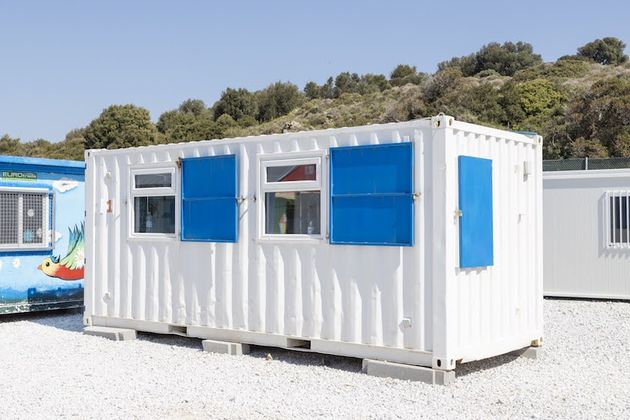
[photo_footer] The exterior of the container where Irene Lopez teaches./ Eurorelief. [/photo_footer]
Q: Many of the people who come to the camp come from other cultural and religious backgrounds. How do you live your faith on a daily basis?
A: I would say out of respect for the people I serve and their beliefs.
Eurorelief invites us to share about our faith in a natural way if someone asks us about the work we do, how we are working in Greece or our own personal story, but we are asked to avoid external signs, like t-shirts with slogans and so on, which can create a conflict.
As a team we also have a devotional time in the mornings and we pray also for the needs of the camp, and especially for our students.
Camp residents who are interested in knowing more about God can visit different organisations near the camp where we have worship services, Bible studies and give away copies of the Bible.
Q: What reflection related to your Christian faith would you like to share about your experience on Lesbos?
A: I recently went to play a football match with another group of volunteers and my glasses broke. When I returned to Spain for Christmas I took them to the optician's where I bought them to get them repaired and they asked me how they had broken.
Then I started talking about what I do in the camp and I know they were impressed.
It is something I have experienced on several occasions. And yet, having worked for five years in a highly complex, culturally diverse school, I think that what I do in Lesbos is not so different from the need I saw in my school.
At the end it's about looking around and seeing what the needs are. It could be a neighbour, a co-worker, someone we often play sports with, a refugee arriving from Ukraine or other multiple needs. The need is everywhere.
The point is in the way we look at what is going on around us.
[donate]

Las opiniones vertidas por nuestros colaboradores se realizan a nivel personal, pudiendo coincidir o no con la postura de la dirección de Protestante Digital.
Si quieres comentar o